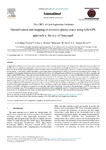Quantification and mapping of domestic plastic waste using GIS/GPS approach at the city of Guayaquil

Use este enlace para citar
http://hdl.handle.net/2183/31068
Excepto si se señala otra cosa, la licencia del ítem se describe como Atribución-NoComercial-SinDerivadas 3.0 España
Colecciones
- Investigación (FCIE) [1228]
Metadatos
Mostrar el registro completo del ítemTítulo
Quantification and mapping of domestic plastic waste using GIS/GPS approach at the city of GuayaquilFecha
2022-03-08Cita bibliográfica
J. Hidalgo-Crespo, C.I. Álvarez-Mendoza, M. Soto, J.L. Amaya-Rivas, Quantification and mapping of domestic plastic waste using GIS/GPS approach at the city of Guayaquil, Procedia CIRP. 105 (2022) 86–91. https://doi.org/10.1016/j.procir.2022.02.015.
Resumen
[Abstract] A significant contributor to the waste stream is the domestic single-use plastic used in households, being the final disposal in most cases the local landfill. There is a significant opportunity to promote resource recovery and efficiency through the introduction of circular economy strategies. However, the knowledge and management of post-consumer plastic waste in the country is poor, and there is a lack of an efficient collection and sorting system. In this context, spatial information on domestic plastic waste generation (DPWG) is essential for recycling decision-making. The integration of Geographic Information Systems (GIS) and the Global Positioning System (GPS) shows an opportunity to collect, mapping, and analyse spatial DPWG issues. Thus, this paper had a double objective. The first was to assess the evolution of eight different types of plastic waste in the city’s households and their daily per capita generation between 2019 and 2021. The second objective was to provide a complete geo-referenced information on the quantities and typologies of domestic plastic waste (DPW) produced in Guayaquil and analyse how the flows have shifted throughout the years. The results showed that PET is the most generated, recording 97.76% and 100.00 % of the households who generate this type of plastic for 2019 and 2021, respectively, with an average of 13.08 and 15.13 g/day/c. Following, we had HDPE, PP and PVC occupying the second, third and fourth place for 2019 with 5.86, 3.05, 2.54 g/day/c, respectively. On the other hand, for 2021, PP (7.43 g/day/c), HDPE (5.92 g/day/c), and LDPE (3.99 g/day/c) occupied the second, third and fourth, respectively. According to the spatial maps, the DPW increment is in most of the popular zones. These popular zones are neighborhoods with a considerable quantity of population and limited basic services. Most of these people live in extreme poverty, being a possible relation between the COVID-19 lockdown and the increasement of DPW.
Palabras clave
Domestic plastic waste management
Geographical information systems
GIS/GPS
Geographical information systems
GIS/GPS
Versión del editor
Derechos
Atribución-NoComercial-SinDerivadas 3.0 España
ISSN
2212-8271






